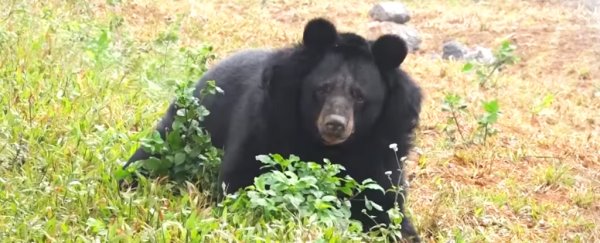A bear that spent 10 years locked away in a bile farm and had her front paws amputated has started a new life in a sanctuary in Vietnam.
Rescued in November by global animal welfare organisation Four Paws, Asian black bear Hai Chan has now ventured outside, and is experiencing the sun, trees, grass and water for the first time in her life.
The farming of bear bile is horrifically cruel, and illegal in many parts of the world.
It's a popular ingredient in traditional Chinese medicine, and the bear bile trade is estimated to be worth around US$2 billion annually, from an estimated 12,000 bears kept in captivity - despite the fact that cruelty-free alternatives are readily available.
The bile is a digestive fluid produced in the bears' livers, and stored in the gallbladder. To farm it, bears are usually kept in tiny cages in which they cannot stand up or turn around, and with a permanent fistula opened or catheter inserted to extract the bile, usually by someone with no veterinary training.
The bears are usually captured in the wild as cubs, their mothers killed by poachers, and they are kept half-starved, dehydrated, and are often diseased and missing teeth from chewing on the bars of their cages.
To make matters worse, sometimes the bears' front paws are amputated, as in the case of Hai Chan, probably to make bear paw wine, a "luxury" beverage made by submerging the severed limb in alcohol.
When she was rescued, Hai Chan was in a miserable state. In addition to the amputated paws, she had enlarged adrenal glands, malnutrition, wounds from the painful bile extraction procedures, and stress disorders.
"These events have taken a huge toll on her," said Four Paws head of international wild animal campaigns Kieran Harkin.
Vets and caretakers at her new home, the newly built Ninh Binh bear sanctuary in Vietnam, nursed her back to health over six weeks before she was well enough to venture outdoors in the safety of her enclosure.
"The moment the doors to the enclosure opened and Hai Chan stuck her nose out of the bear house, our entire team was overcome with emotion," said veterinarian Szilvia Kalogeropoulu.
"This was the first time Hai Chan ever walked on grass. Despite missing her front two paws, she is able to walk on the flats of her front legs and on her stumps.
"We have always been confident that she would walk and cope with her disability, but it's a miracle she built up the strength to do that so fast."
Her recovery started almost immediately. From the day Hai Chan arrived, staff at the sanctuary said they noticed an improvement.
The bear went from lethargic and uninterested to curious and upright. She has a special low hammock bed, since she cannot climb into the higher ones, and her enrichment is placed lower for her to reach. Extra straw is on the floor to make it softer on her forelimbs.
So far, she has been adapting well to her new surroundings, and will soon be able to be socialised with other bears.
"She loves enrichment that has food in it, especially water, spinach, and apples," Kalogeropoulu said. "She likes her comfort and enjoys making a nest to sleep in during the day. Hai Chan is now very relaxed and happy with the bear keepers."
The Vietnamese government embarked on a program to end bear bile farming in 2005, requiring no more bears enter farms, with existing bears to be microchipped, registered and cared for. Farmers also had to sign a declaration to extract no more bile.
In 2017, the Vietnamese government again promised to end bear bile farming, pledging to rescue captive bears. You can sign a petition to increase pressure against the practice here.
